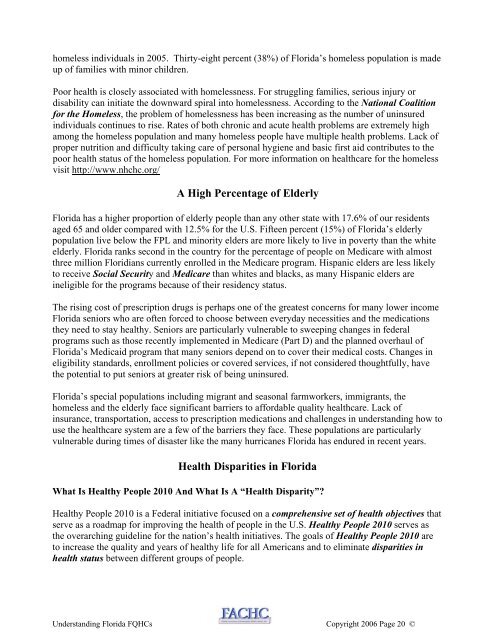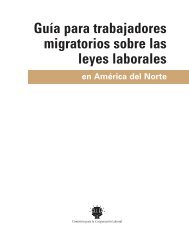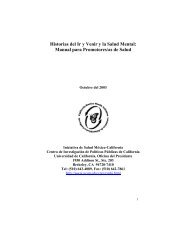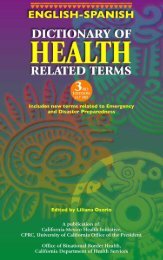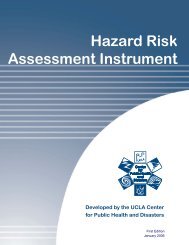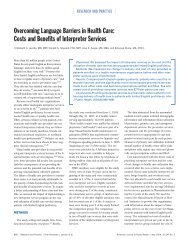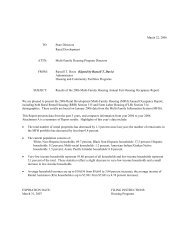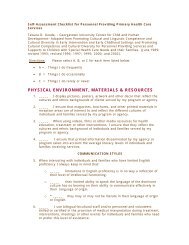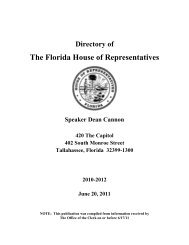Guide to Understanding Florida's FQHCs and 330 Expansion ...
Guide to Understanding Florida's FQHCs and 330 Expansion ...
Guide to Understanding Florida's FQHCs and 330 Expansion ...
Create successful ePaper yourself
Turn your PDF publications into a flip-book with our unique Google optimized e-Paper software.
homeless individuals in 2005. Thirty-eight percent (38%) of Florida’s homeless population is made<br />
up of families with minor children.<br />
Poor health is closely associated with homelessness. For struggling families, serious injury or<br />
disability can initiate the downward spiral in<strong>to</strong> homelessness. According <strong>to</strong> the National Coalition<br />
for the Homeless, the problem of homelessness has been increasing as the number of uninsured<br />
individuals continues <strong>to</strong> rise. Rates of both chronic <strong>and</strong> acute health problems are extremely high<br />
among the homeless population <strong>and</strong> many homeless people have multiple health problems. Lack of<br />
proper nutrition <strong>and</strong> difficulty taking care of personal hygiene <strong>and</strong> basic first aid contributes <strong>to</strong> the<br />
poor health status of the homeless population. For more information on healthcare for the homeless<br />
visit http://www.nhchc.org/<br />
A High Percentage of Elderly<br />
Florida has a higher proportion of elderly people than any other state with 17.6% of our residents<br />
aged 65 <strong>and</strong> older compared with 12.5% for the U.S. Fifteen percent (15%) of Florida’s elderly<br />
population live below the FPL <strong>and</strong> minority elders are more likely <strong>to</strong> live in poverty than the white<br />
elderly. Florida ranks second in the country for the percentage of people on Medicare with almost<br />
three million Floridians currently enrolled in the Medicare program. Hispanic elders are less likely<br />
<strong>to</strong> receive Social Security <strong>and</strong> Medicare than whites <strong>and</strong> blacks, as many Hispanic elders are<br />
ineligible for the programs because of their residency status.<br />
The rising cost of prescription drugs is perhaps one of the greatest concerns for many lower income<br />
Florida seniors who are often forced <strong>to</strong> choose between everyday necessities <strong>and</strong> the medications<br />
they need <strong>to</strong> stay healthy. Seniors are particularly vulnerable <strong>to</strong> sweeping changes in federal<br />
programs such as those recently implemented in Medicare (Part D) <strong>and</strong> the planned overhaul of<br />
Florida’s Medicaid program that many seniors depend on <strong>to</strong> cover their medical costs. Changes in<br />
eligibility st<strong>and</strong>ards, enrollment policies or covered services, if not considered thoughtfully, have<br />
the potential <strong>to</strong> put seniors at greater risk of being uninsured.<br />
Florida’s special populations including migrant <strong>and</strong> seasonal farmworkers, immigrants, the<br />
homeless <strong>and</strong> the elderly face significant barriers <strong>to</strong> affordable quality healthcare. Lack of<br />
insurance, transportation, access <strong>to</strong> prescription medications <strong>and</strong> challenges in underst<strong>and</strong>ing how <strong>to</strong><br />
use the healthcare system are a few of the barriers they face. These populations are particularly<br />
vulnerable during times of disaster like the many hurricanes Florida has endured in recent years.<br />
Health Disparities in Florida<br />
What Is Healthy People 2010 And What Is A “Health Disparity”<br />
Healthy People 2010 is a Federal initiative focused on a comprehensive set of health objectives that<br />
serve as a roadmap for improving the health of people in the U.S. Healthy People 2010 serves as<br />
the overarching guideline for the nation’s health initiatives. The goals of Healthy People 2010 are<br />
<strong>to</strong> increase the quality <strong>and</strong> years of healthy life for all Americans <strong>and</strong> <strong>to</strong> eliminate disparities in<br />
health status between different groups of people.<br />
<strong>Underst<strong>and</strong>ing</strong> Florida <strong>FQHCs</strong> Copyright 2006 Page 20 ©


